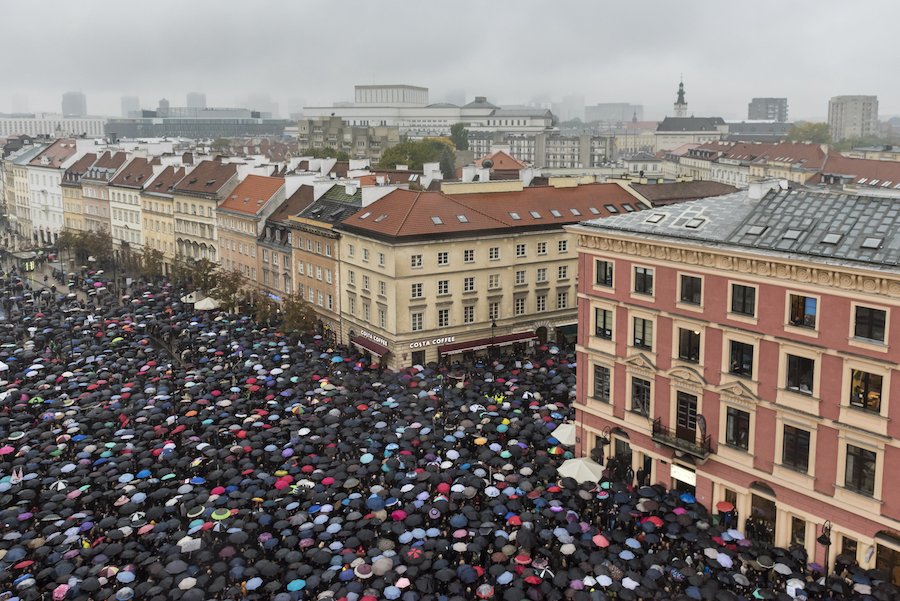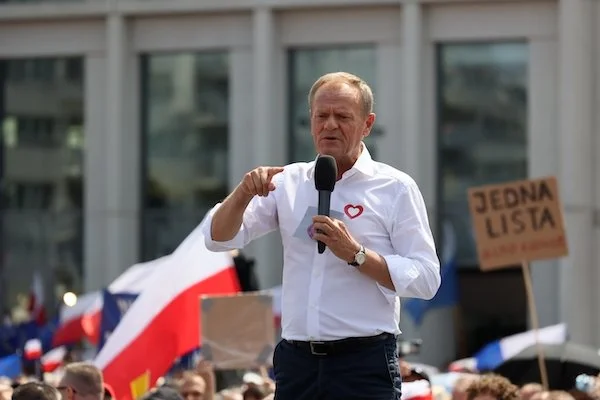The Poles Have Spoken
While a historic election brings hope, Poland remains highly polarized.
Read
For eight years, the nationalist Law and Justice Party has ruled Poland. It set about taking over public media, the courts and cultural institutions, while tightening restrictions on abortion and immigration. But this month Poles said, “Stop.” Voters turned out in record numbers and delivered a rebuke to extremism, electing a centrist coalition to run the government. We welcome feminist scholar and activist Agnieszka Graff to discuss this remarkable turn of events and what lies ahead for her riven country.
In 2013, Graff attended an event hosted by a Dominican church group for what was supposed to be a progressive discussion on gender issues. Before the event could begin, far-right protestors set off smoke bombs and unfurled a banner declaring “Gender = 666” — coded language asserting anti-feminist, anti-trans, homophobic values. Poland had become a flashpoint in a global war on gender expression, linked in fundamental ways to ideas about national purity. Graff has since participated, as both an analyst and activist, in waves of mass protests that have rocked Poland during the reign of Law and Justice, known also by the Polish acronym PiS.
Meet
Agnieszka Graff is an activist and professor of literature at the University of Warsaw. Her research focuses on gender, women’s history, nationalism and civic discourse. She is the author of four books of feminist essays written in Polish, including Matka feministka, or “feminist mother” (Wydawnictwo, 2014). Most recently, she published Anti-Gender Politics in the Populist Moment (Routledge, 2022), with coauthor Elzbieta Korolczuk. Follow the University of Warsaw @UniWarszawski.
Anti-Gender Politics looks at the rise of right-wing populism around the world, funded by groups seeking to reinforce patriarchal ideas about the family and gender relations. These movements aren’t just a backlash against feminism, the authors say. They’re also a response to economic crises brought on by dogmatic free-market policies. (Cf. our last episode with David Leonhardt!)
The entire book is also available by open access.
Graff and Korolczuk previewed their argument linking anti-gender movements to a rising global illiberal order, in a 2018 journal article titled “Gender as ‘Ebola from Brussels.’ ”
In 2016, Polish women began staging what came to be known as the “Black Protests,” railing against legislation that would have made their country’s 1990s-era abortion bans even more draconian. These protests grew out of grassroots feminism, Graff writes — and they successfully defeated the proposed measure.
Across history, Polish women have redefined powerful national symbols to plead their case for equality. Graff examines a few of these — including shipyards, cowboy hats and anchors — in a 2019 article for East European Cultures and Societies.
Graff has commented on the feminist struggle in the United States as well. After the leak of a draft Supreme Court opinion overturning Roe v. Wade, she suggested that Americans could learn a lot from Poland’s populist feminism — built on affect and solidarity instead of ideas about “individual rights.”
Learn
Three years ago this month, Poland’s high court pretty much wiped out the gains of the Black Protest movement. Dominated by Law and Justice appointees, the tribunal ruled that fetal defects could not be grounds for an abortion. Thousands more demonstrators flooded the streets in response.
Human Rights Watch documents the fear and real dangers that Polish women face, including government investigations into miscarried pregnancies.
But Law and Justice is now out. Together, the country’s opposition parties won some 54 percent of the vote in the Oct. 15 national elections. Turnout was massive, with nearly three-quarters of Poles casting ballots. That figure rivals voting rates in the 1989 elections, the first held after the collapse of the Soviet bloc.
Writing for The Atlantic, Anne Applebaum says Sunday’s results offer hope for democracies everywhere that “autocracy is not inevitable.”
But Politico’s Jan Cienski urges caution in response to the outcome, and outlines the long road ahead for leaders of the new governing coalition. For one, Cienski says, it could be as late as December before they can form a new government.
Donald Tusk, a former prime minister, will likely lead that government. He heads the Civic Coalition Party, which garnered about a third of the vote. Guardian correspondent Shaun Walker imagines what a Tusk administration might accomplish, including improving relations with the EU and Ukraine.
Law and Justice leaned hard on anti-immigration sentiments and xenophobia in Poland. But activists — and artists — have been pushing back. This year’s film The Green Border, from director Agnieszka Holland, won the Special Jury Prize at the 2023 Venice Film Festival. It dramatizes the plight of migrants moving through the forests of Eastern Europe in search of refuge.
Holland publicly accused the Law and Justice Party of pressuring the Academy Awards not to accept the movie as a nominee for best international film.
Red lightning bolts, vulgar language, black umbrellas and coat hangers. These symbols have played a big part in the Polish women’s movement. Blogger Agnieszka Wadolowska explains what they all mean.
Ola Jasionowska designed that red lightning bolt, which became such a recognizable sign for women’s rights in Poland. Read an interview with the artist in Art Net News.
“Artivism” — or activist art — is flourishing, and not just in Poland. The University of British Columbia has been holding its annual Artivism Festival since Sept. 6. It wraps up this week.
Students in Boston-area schools have been participating of late in a pilot program designed to foster connections between art and social justice.
And, as we’ve been saying… it seems like democracy itself is increasingly on the ballot all over the world. Voters will head to the polls soon to elect a new president in Argentina, where Javier Milei — who calls himself an “anarcho-capitalist” — has emerged as a surprise frontrunner.
In an op-ed for The Hill, Pamela Shifman writes about the moves that America’s anti-gender movement is making. In Florida, the state board of education voted to forbid teaching about sexual orientation in all grades.
The United Nations, meanwhile, calls on feminist movements to push back against anti-gender campaigns. In April, a UN office representing women’s interests in Eastern Europe and Central Asia unveiled an exhibit honoring those who use art to further their causes.
Heard on the show
We dropped some news clips in the top of this show. Al Jazeera reported on the Oct. 15 election results. And for the full story on PiS leader Jaroslaw Kaczynski’s weird comments about women and drinking, visit Euronews.
Transcript
Coming soon!











